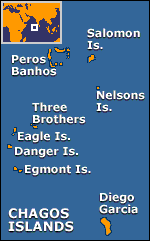Homecoming
 The Chagossians have been royally shafted by the British government for the last forty-odd years. Now, finally, according to the Scotsman (via) they are to be allowed to return - albeit briefly - to their island homes:
The Chagossians have been royally shafted by the British government for the last forty-odd years. Now, finally, according to the Scotsman (via) they are to be allowed to return - albeit briefly - to their island homes:In a concession by the UK's Foreign and Commonwealth Office, more than 100 Chagossians will be making the journey by boat on March 30. The trip will encompass the islands of Peros Banhos, Salomon and Diego Garcia, the main islands on which the Chagossians lived, and will include visits to their former homes, churches and the graves of their ancestors.The journey to the island will take four days, with one day on each island. This visit has been promised for years, with various hicchoughs intervening to prevent it.
A spokeswoman for the FCO says the trip, arranged for humanitarian reasons, had been planned since 2003 but delayed on several occasions due to the difficulties in finding a seaworthy vessel and the short window of opportunity when tides make the islands easily accessible.This time, however, it looks like it might finally take place, much to the islanders' delight:
"I am very excited to go home," says [Rita] Elysee, now 80 and living in Mauritius. "It is my dream to see the grave of my father. He was alive when I left, but died a year after. I have not even been able to pay tribute to him or lay a flower on his grave until now."Elysee apparently told the Scotsman that "she intends to kneel down and kiss the land of her birth." Other Chagossians, including community leader Olivier Bancoult are similarly enthusiastic:
"This will be a big satisfaction for me," says Bancoult, who was born on Peros Banhos and left at the age of four. "Since 1983 I have been fighting for the right of my people to put their feet on the soil of their birthplace. Now one of my dreams has become a reality. It will feel marvellous to accompany my people, especially my mother and my sister. It has been my dream to go with my family. It will be very historical, very emotional and nostalgic. Everyone will be crying."The islanders intend to leave several monuments which they have already prepared and two priests will accompany them to bless the graves of their ancestors. Also in the party made up of Chagossians from communities in Mauritius and the Seychelles will be a doctor and nurse, neccesary given the age of many of travellers.
While this return is only a transient one, there are hopes that it will not be the last time the Chagossians are able to stand on the land they once called home:
That the islands are still an agreeable place to live is not in doubt, despite US claims that resettlement is unfeasible. This claim has been refuted by independent environmental analysts and the experience of the Asian tsunami when the 6ft wave that hit Diego Garcia caused no damage to facilities.The co-habitation line, that the Chagossians and the Americans can live alongside each other, seems to be the line being pushed by the Chagossian community. There is no doubt that it is technically true. The two could easily share the island. There is a question mark, however, overs whether the Americans are prepared to do so. Recall (as if you could forget) that it was they who insisted the entire Chagos Archipelago be "swept" and "sanitised" in order that they could set up their base on Diego Garcia. Recall also that they have brought in workers from Mauritius and the Philippines, but never employed any of the exiled inhabitants. One also has to wonder whether the Chagossians want to share their homes with such a key component in the American war machine. As bad neighbours go it's gotta be up there...
Moreover, the islands have already been resettled - by the US military, which has built a library, post office, bank and chapel for the 1,700 troops there, and enough housing for them and an additional 1,500 civilian workers.
And the US navy website assures incoming servicemen that "personal living conditions on the island are excellent". It is observations like this that make native Chagossians such as Bancoult more determined to one day create a permanent settlement and even, perhaps, establish a tourism industry on the islands.
"The battle is not at an end," Bancoult said. "We can agree to co-habit with the Americans."
File Under: Chagos, Politics



















<< Home